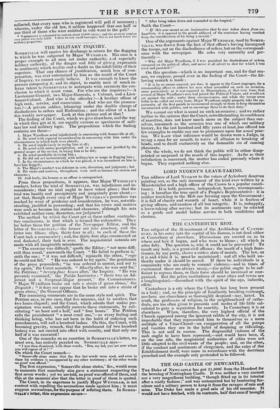THE CANTERBURY RIOT.
THE subject of the ill-treatment of the Archbishop of CANTER- BURY, in his entry into the capital of his diocese, is not dead either at Canterbury or elsewhere. Discussions are carried on as to where and how it began, and who were to blame ; all which is utter folly. The question is, why it could not be prevented? • To insult any body, is a great civil offence ; the insult of a high func- tionary, by any party, shows a rotten state of morals. The law, as it is and while it is, must be maintained ; and all who hold au- thority under it should be sacred. If there be individuals in a community who are ready to commit violence,—and in times of excitement there are always many,—the police ought to be suf- ficient to repress them, or their force should be increased or reor- ganized. But the police institutions of most cities and towns are a laughingstock—discordant with the spirit of the age, imbecile, effete.
Canterbury is a city where the Church has long been present in a body; and, on the principle of familiarity breeding contempt, nowhere are churchmen so thoroughly despised—nay, hated. In. truth, the professors of religion, in the neighbourhood of cathe- drals, are too often given to pursuits and modes of life little cal- culated to gain a reputation for sanctity. In Canterbury it is as elsewhere. When, therefore, the very highest official of the Church appeared among the ignorant rabble of the city, it is not improbable that they represented him to themselves as a mere multiple of a Vicar-Choral—an exaggeration of all the pomps and vanities they are in the habit of despising or ridiculing, This is not said in excuse. The disgraceful violence of the . mob ought to have been repressed,—and would have been, if on the one side, the magisterial authorities of cities were not little adapted to the civil wants of the people; and, on the other,, if the conduct and sentiments of clergymen, and the rules of the Establishment itself, were more in accordance with the doetrinqs preached and the example only pretended to be followed.


























 Previous page
Previous page